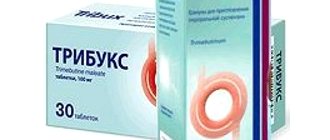Naproff tablets 550 mg, 10 pcs.
Adverse reactions of the drug can be minimized by using the smallest effective dose for the shortest possible time necessary to improve the condition (see Section "Dosage and Administration" and sections "Effects on the digestive tract" and "Effects on the cardiovascular system and cerebral circulation" below).
The simultaneous use of the drug with other NSAIDs, including selective COX-2 inhibitors, should be avoided.
Hypersensitivity reactions
Patients suffering from asthma in combination with chronic rhinitis, chronic sinusitis and/or nasal polyps are at higher risk of allergies to acetylsalicylic acid and/or NSAIDs than other patients. The use of the drug may cause asthma attacks or bronchospasm, especially in patients with an allergy to acetylsalicylic acid or NSAIDs (see section “Contraindications”).
Use in elderly patients
Elderly patients are particularly susceptible to adverse reactions when using NSAIDs, especially gastrointestinal bleeding and perforation, which can be fatal. Long-term use of NSAIDs is not recommended for such patients. If long-term treatment is required, patients should be monitored regularly (see Dosage and Administration section and below).
Anaphylactic (anaphylactoid) reactions
Hypersensitivity reactions may occur in susceptible individuals. Anaphylactic (anaphylactoid) reactions can occur in patients regardless of the presence of hypersensitivity to acetylsalicylic acid, other NSAIDs or drugs with naproxen in history. They may also occur in people with a history of angioedema, bronchospasm (eg, asthma attacks), rhinitis, and polyps.
Anaphylactoid reactions, such as anaphylaxis, can be fatal.
Effect on the digestive tract
Gastrointestinal bleeding, ulcer formation or perforation, in some cases with fatal outcome, was observed for all NSAIDs at different stages of treatment, regardless of the presence of warning symptoms or a history of serious pathology of the digestive tract.
The risk of gastrointestinal bleeding, ulcer formation or perforation increases with increasing dose of NSAIDs in patients with a history of ulcers, especially those complicated by bleeding or perforation (see section "Contraindications"), as well as in elderly patients. Treatment of such patients should begin with the lowest possible dose of the drug. For such patients and patients taking acetylsalicylic acid in small doses or other drugs that increase the risk of adverse reactions from the digestive tract (see Section “Interaction with other drugs and other types of interactions”), combination therapy with drugs should be considered. protectors such as misoprostol or proton pump inhibitors.
Patients, especially elderly patients with a history of adverse reactions from the digestive tract, should inform the doctor about any unusual symptoms associated with the digestive system, in particular gastrointestinal bleeding, especially in the initial stages of treatment.
The drug should be used with caution in patients who are concomitantly using drugs that may increase the risk of ulceration or bleeding, such as oral corticosteroids, anticoagulants (for example, warfarin), SSRIs or antiplatelet drugs such as acetylsalicylic acid (see " Interaction with other drugs and other types of interactions").
If an ulcer or gastrointestinal bleeding develops, the use of the drug should be discontinued.
The drug should be used with caution in patients with a history of diseases of the digestive tract (ulcerative colitis, Crohn's disease), since there is a risk of exacerbation (see Section "Adverse Reactions").
Effect on the cardiovascular system and cerebral circulation
In patients with hypertension and/or a history of mild to moderate congestive heart failure, close monitoring is recommended as fluid retention and edema have been observed with the use of NSAIDs.
Clinical trial and epidemiological data suggest that the use of some NSAIDs (especially at high doses and during long-term treatment) may be associated with a small increased risk of vascular thrombotic events (such as myocardial infarction or stroke). According to available data, when using naproxen at a dose of 1000 mg per day, the risk is minimal, but it cannot be completely excluded.
Patients with uncontrolled hypertension, congestive heart failure, established coronary artery disease, peripheral arterial disease and/or cerebrovascular disease should use the drug only after careful evaluation. Such an examination is necessary before starting long-term treatment of patients with risk factors for cardiovascular diseases (for example, hypertension, hyperlipidemia, diabetes mellitus, smokers).
Allergic reactions
Very rare cases of serious skin reactions (some fatal) have been reported with the use of NSAIDs, including exfoliative dermatitis, Stevens-Johnson syndrome and toxic epidermal necrolysis (Lyell's syndrome) (see Adverse Reactions section). Probably the greatest risk of their occurrence is observed in patients at the beginning of treatment; in most patients they occurred during the 1st month of therapy. If skin rashes, signs of damage to the mucous membranes or other symptoms of hypersensitivity appear, you should stop using the drug.
Functional renal failure
Impaired renal function, renal failure, acute interstitial nephritis, hematuria, proteinuria, renal papillary necrosis and nephrotic syndrome have been reported to be associated with naproxen.
NSAIDs, due to inhibition of the vasodilatory effects of renal prostaglandins, can induce functional renal failure by reducing glomerular filtration. This side effect is dose dependent. At the beginning of treatment or after increasing the dose, careful monitoring of diuresis and renal function is recommended in patients with the following risk factors:
- elderly age;
- simultaneous use with ACE inhibitors, angiotensin II antagonists, Sartan, diuretics (see Section “Interaction with other drugs and other types of interactions”);
- hypovolemia (of any origin);
- congestive heart failure;
- renal failure;
- nephrotic syndrome;
- lupus nephropathy;
- decompensated cirrhosis of the liver.
Since the bulk of naproxen and its metabolites (95%) are excreted by the kidneys by glomerular filtration, the drug should be used with caution in patients with impaired renal function. Continuous monitoring of creatinine clearance is recommended. In such patients, the minimum effective dose should be used.
The drug is contraindicated in patients with initial creatinine clearance below 30 ml/min.
Hemodialysis leads to a decrease in plasma concentrations of naproxen due to the high degree of binding of naproxen to plasma proteins.
Use in patients with liver dysfunction
As with the use of other NSAIDs, an increase in liver function parameters is possible. This is often the result of hypersensitivity to NSAIDs rather than direct toxicity. Severe liver disorders, including hepatitis and jaundice, have been reported. Cross-reactivity has also been reported.
Effect on water-salt metabolism
When using naproxen, fluid retention is possible, which leads to edema, arterial hypertension or worsening of existing hypertension, exacerbation of heart failure. When using the drug, clinical monitoring of the condition of patients with arterial hypertension or heart failure should be carried out. It is also possible that the effectiveness of antihypertensive drugs may decrease (see Section “Interaction with other drugs and other types of interactions”).
Risk of hyperkalemia
When naproxen is used in patients with diabetes mellitus or in patients who are simultaneously taking drugs that increase potassium levels, hyperkalemia may develop (see Section "Interaction with other drugs and other types of interactions"). In such patients, regular monitoring of plasma potassium levels is recommended.
Use for infectious lesions
The drug should be used with caution in case of infectious lesions or at risk of infection, since naproxen reduces the body's resistance to infectious agents and can mask the symptoms of infections.
Long-term use
In case of long-term use of the drug, blood tests should be carried out regularly and kidney and liver function should be monitored.
Hematological reactions
Naproxen inhibits platelet aggregation and may prolong bleeding time, which should be taken into account when determining bleeding time. When using the drug, the condition of patients with blood clotting disorders or those taking drugs that affect hemostasis should be monitored.
Effects on the organs of vision
Ocular disorders, including papillitis, retrobulbar optic neuritis, and papillary edema, have been reported occasionally with use of NSAIDs, including naproxen, although a causal relationship has not been established. Patients who develop visual impairment while using the drug are advised to consult an ophthalmologist.
Caution associated with excipients
The 275 mg medicinal product contains approximately 25 mg sodium, the 550 mg medicinal product contains approximately 50 mg sodium, must be taken into account in patients on a sodium controlled diet.

